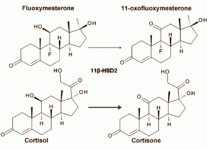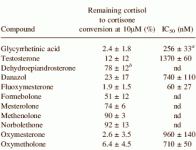Halotestin is a cortisol booster
Halotestin – whose active ingredient is fluoxymesterone – is one of the riskiest anabolic steroids around. Now toxicologists at the University of Basel have discovered why. According to the in-vitro study they did Halotestin can cause a dramatic rise in the concentration of cortisol.
Halotestin is an oral anabolic steroid. Like other oral steroids it can put considerable strain on the liver. In addition, Halotestin is a strong androgen, with virilizing properties, and it is incapable of converting into a compound with oestrogenic characteristics.
Despite all this, the manufacturer Pfizer warns of a contraindication that you wouldn't expect from a steroid that can't be converted into oestrogenic compounds. "Edema, with or without congestive heart failure, may be a serious complication in patients with pre-existing cardiac, renal or hepatic disease."*[pfizer.com]
The researchers discovered how Halotestin – and therefore perhaps also other anabolic steroids – can lead to oedema and therefore also cardiovascular problems. Halotestin pinches the enzyme 11-beta-HSD2, which converts cortisol into the less active cortisone. As a result the 11-hydroxyl group of the Halotestin gets converted into an 11-oxo group. Because the 11-beta-HSD2 is lost the concentration of cortisol in the body mounts up.
The researchers looked at whether there were more compounds that can sabotage the conversion of cortisol into cortisone and discovered that Halotestin is an exceptionally strong inhibitor of 11-beta-HSD2. Halotestin is even stronger than glycyrrhetinic acid, a substance found in liquorice that can cause blood pressure to rise sharply.
Oxymesterone – or 4-hydroxy-17-methyl-testosterone – and to a lesser extent oxymetholone inhibit 11-beta-HSD2 almost as much as Halotestin does.
The researchers also discovered that Halotestin cannot interact directly with cortisol receptors.
Cortisol disturbs the electrolyte balance. It induces the body to retain more sodium and therefore also more liquid. That means that the amount of plasma in the blood increases and as a result blood pressure rises. On top of that, a higher level of cortisol has a narrowing effect on the blood vessels, which in turn also raises blood pressure. And finally, cortisol makes blood vessels more susceptible to damage caused by cholesterol build-up in the blood vessel walls.
"Thus, anabolic androgenic steroids that inhibit 11-beta-HSD2, like fluoxymesterone, may be especially prone to cause adverse cardiovascular effects", the researchers conclude.
As far as we know Halotestin is only available in oral form. Which is a good thing too. The newly discovered properties of Halotestin probably become even stronger when the stuff is injected rather than taken orally.
Source:*
Toxicol Sci. 2012 Apr;126(2):353-61.


Halotestin – whose active ingredient is fluoxymesterone – is one of the riskiest anabolic steroids around. Now toxicologists at the University of Basel have discovered why. According to the in-vitro study they did Halotestin can cause a dramatic rise in the concentration of cortisol.
Halotestin is an oral anabolic steroid. Like other oral steroids it can put considerable strain on the liver. In addition, Halotestin is a strong androgen, with virilizing properties, and it is incapable of converting into a compound with oestrogenic characteristics.
Despite all this, the manufacturer Pfizer warns of a contraindication that you wouldn't expect from a steroid that can't be converted into oestrogenic compounds. "Edema, with or without congestive heart failure, may be a serious complication in patients with pre-existing cardiac, renal or hepatic disease."*[pfizer.com]
The researchers discovered how Halotestin – and therefore perhaps also other anabolic steroids – can lead to oedema and therefore also cardiovascular problems. Halotestin pinches the enzyme 11-beta-HSD2, which converts cortisol into the less active cortisone. As a result the 11-hydroxyl group of the Halotestin gets converted into an 11-oxo group. Because the 11-beta-HSD2 is lost the concentration of cortisol in the body mounts up.
The researchers looked at whether there were more compounds that can sabotage the conversion of cortisol into cortisone and discovered that Halotestin is an exceptionally strong inhibitor of 11-beta-HSD2. Halotestin is even stronger than glycyrrhetinic acid, a substance found in liquorice that can cause blood pressure to rise sharply.
Oxymesterone – or 4-hydroxy-17-methyl-testosterone – and to a lesser extent oxymetholone inhibit 11-beta-HSD2 almost as much as Halotestin does.
The researchers also discovered that Halotestin cannot interact directly with cortisol receptors.
Cortisol disturbs the electrolyte balance. It induces the body to retain more sodium and therefore also more liquid. That means that the amount of plasma in the blood increases and as a result blood pressure rises. On top of that, a higher level of cortisol has a narrowing effect on the blood vessels, which in turn also raises blood pressure. And finally, cortisol makes blood vessels more susceptible to damage caused by cholesterol build-up in the blood vessel walls.
"Thus, anabolic androgenic steroids that inhibit 11-beta-HSD2, like fluoxymesterone, may be especially prone to cause adverse cardiovascular effects", the researchers conclude.
As far as we know Halotestin is only available in oral form. Which is a good thing too. The newly discovered properties of Halotestin probably become even stronger when the stuff is injected rather than taken orally.
Source:*
Toxicol Sci. 2012 Apr;126(2):353-61.



